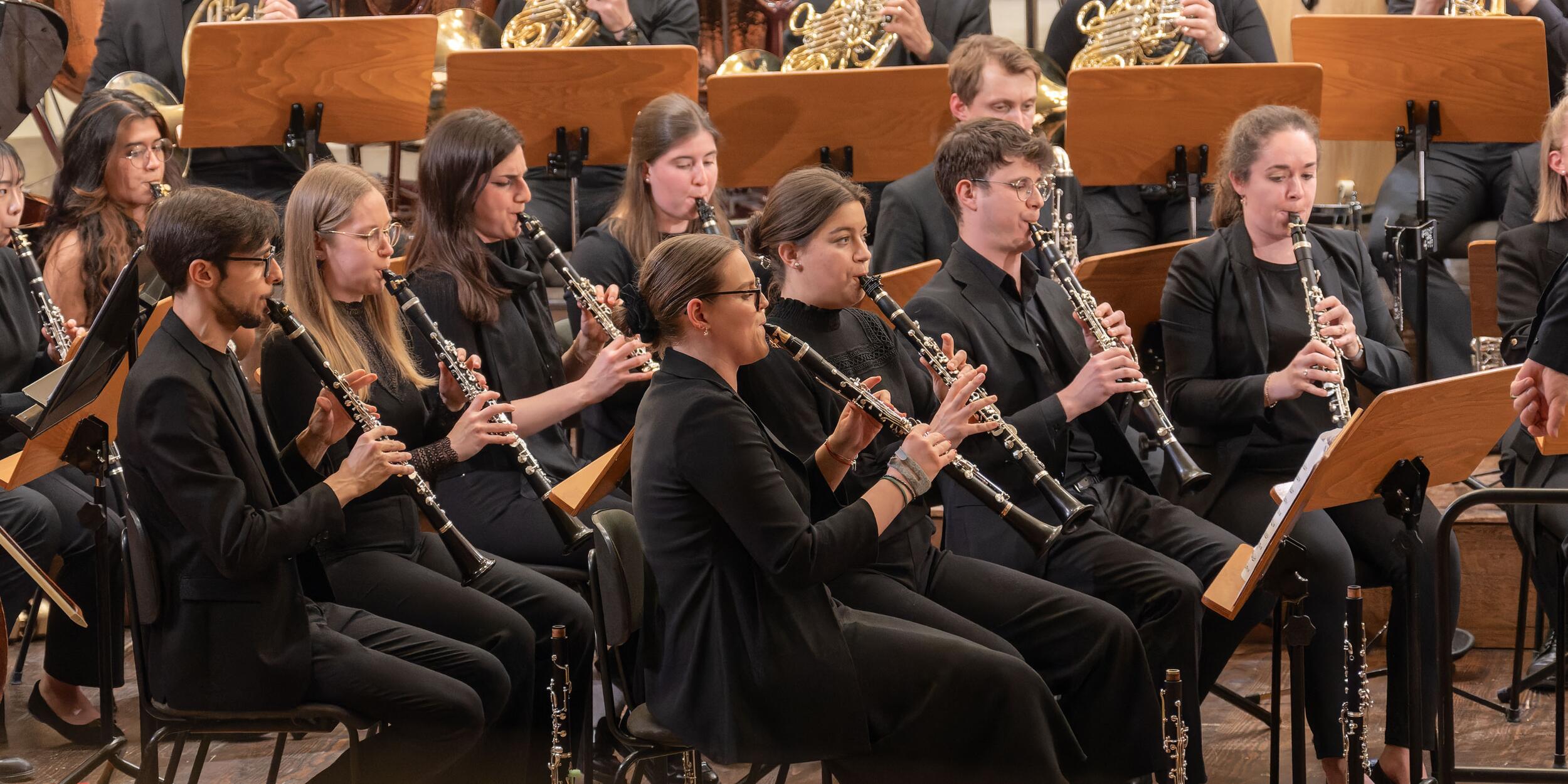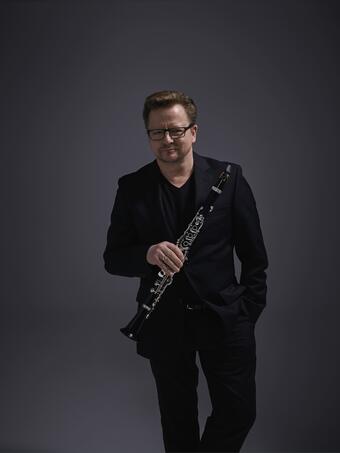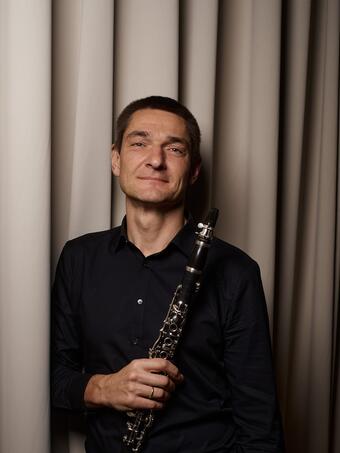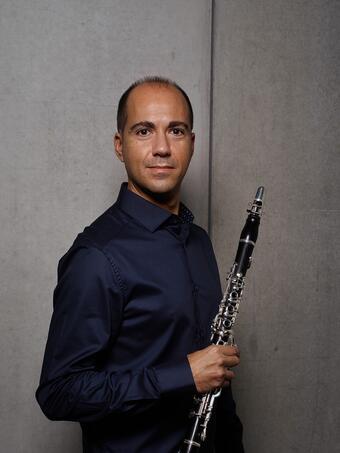Clarinet

Overview
The bachelor's degree programme in clarinet provides advanced, pre-professional musical training in solo, chamber music, and orchestral performance. In addition to the teaching content, performance opportunities across a wide range of repertoire are offered under the direction of renowned guest conductors.
Department of Studies & Examinations
+43 676 88122 492
studienabteilung@moz.ac.at
Length of course
8 semesters / 240 ECTS-AP
Language
German
Application period
1.2.–28.2.2025
Auditions
summer semester each year
dates see at "Audition dates"
overview of all dates
Downloads
General information
This degree course is oriented around current developments and performance practice in the arts, as well as the latest, most up-to-date research in the academic disciplines involved. The goal of the BA in Performance is the practice-oriented and academically sound professional preparation for the following fields:
- Soloist
- Chamber musician
- Orchestral musician (e.g. in chamber/opera/symphony orchestras, orchestras and ensembles for contemporary music, ensembles for historical instruments)
- Freelance artist
The goals of the BA in Performance at the Mozarteum University are artistic maturity and independence, critical self-reflection and evaluation, and the artistic and scientific ability to interpret musical works from all periods. The BA in Performance will equip students to pursue their chosen profession and to fulfil artistic, pedagogical and organisational tasks within cultural life.
The curriculum is competence-oriented. After completing the Bachelor's programme, students should:
- be able to master their instrument and present themselves professionally
- be free and independent in their artistic work
- be able to deal critically with artistic and academic issues
- be able to play professionally in an orchestra/ensemble
- be able to work as a team-player in an artistically constructive way as a member of a chamber music formation or ensemble
- have acquired comprehensive knowledge of various playing techniques
- have acquired comprehensive knowledge of the orchestral repertoire and mastery of the relevant orchestral parts and the solo and chamber music literature of various periods
- have basic knowledge of stylistics and repertoire
- have gained insight into the repertoire and performance practice of both early and contemporary music
- have acquired comprehensive knowledge of music theory and musicology and be able to apply this in practice
- have mastered the basics of scholarly working practices and be able to analyse, interpret and write about artistic content in a grounded manner
- be able to use audiovisual media for self-presentations (such as competition submissions, demo recordings, internet presentations etc.)
- have gained insights into the areas of physical and mental health maintenance, self-management and performance optimisation
- have further developed their individual interests beyond their own subject area through targeted selection of elective subjects in the spirit of lifelong learning
The eight-semester bachelor's degree programme is modular in structure. Each module comprises teaching and learning content that has been combined to form thematically and didactically meaningful units of study. The names and content descriptions (study objectives) of the individual modules, the number of ECTS credits to be achieved for each module, and the type of performance assessment are specified in the curriculum. The module descriptions refer to the corresponding learning outcomes and competencies. The Bachelor's programme is a face-to-face programme and cannot be offered - not even in part - as a distance learning programme. The courses from the Principal Study, as well as in other One-to-One Tuition, are designed to build upon each other. Prerequisite for enrolment in courses from the Principal Study or One-to-One Tutition is a positive evaluation of the previous semester (from the second semester onwards).
The curriculum provides an overview of the courses to be completed, which are grouped into modules.
The courses are visible online in Curriculum Support:
A prerequisite for beginning a bachelor's degree (BA) is passing an audition. Auditions take place once a year and consist of various partial exams. All information about the audition can be found under “Information about the admissions procedure” further down the page.
A high school diploma is not necessary.
PLEASE NOTE: You can only apply for study programmes for which you have not yet obtained a degree!
Students of the Bachelor's programme are encouraged to complete a semester abroad. Semesters 5 and 6 of the degree programme are particularly suitable for this. In addition to subject-specific competences, a study period abroad can also lead to the acquisition and deepening of:
- Subject-specific foreign language skills
- General foreign-language skills (language comprehension, conversation, etc.)
- Organisational skills, through independent planning of everyday student life in international administrative and university structures
- Knowledge about international study systems, as well as broadening one's own subject perspective
- Intercultural competences
Examinations and assessments taken during studies abroad can be approved by the Director of Studies as equivalents to compulsory subjects, elective sujects or free elective subjects required by the Mozarteum University for your degree course. The documents required for the approval procedure are to be submitted by the applicant immediately after their exchange semester.
Details at International Affairs.
Information on the admissions process
A prerequisite for admission to the Bachelor's degree programme (BA) is passing an audition, for which applicants must register online via Muvac. Following approval of the application by the university’s admissions office, applicants will be invited to upload an application video to Muvac. Applicants who pass the video round will be invited to an on-site audition in Salzburg.
PLEASE NOTE:
- Evaluation of all application videos will commence only after the deadline for video uploads (20.03.2025) has passed, and can take up to 4 weeks!
- Applicants can only apply for degree programmes for which they have not yet obtained a degree!
A pre-selection of applicants will be made by the audition panel based on the videos submitted. The selected applicants will be invited to an on-site audition, which consists of several parts.
2. Once in the MOZonline account: fill in the mandatory statistics UHstat1 (pre-registration for studies) and make a note of the application number that is sent by email upon submission of this information.
3. Create an application account in Muvac
4. Fill out your own profile in Muvac (minimum requirements: personal data, information on expertise matching the desired degree programme, in the CV: current employment and information on previous training)
6. Fill out the application form in Muvac ("Apply now"), being sure to enter your application number (see step 2) or Austrian matriculation number in the appropriate field
Please take a look at the FAQs about registration in Muvac if you have any problems.
Upon successful processing of their application, applicants will be invited to the video pre-selection round in Muvac.
Applicants who wish to accept the invitation must upload their video by 20th March 2025.
If an applicant fails to confirm their participation in the video pre-selection in Muvac before the deadline, and therefore does not upload a video, their application will not be considered and the status of the application will be changed to "did not participate". In this case, the application process will automatically be discontinued.
Video files are to be created by the applicant themselves and uploaded to the application platform Muvac. The following guidelines must be observed:
- Both the face and body of the applicant must be visible in the video.
- The picture and sound quality of the video should be as good as possible. If the sound and/or image quality is insufficient, the video will not be considered.
- The sound recording in the video must not be electronically amplified or altered.
- Video editing is not permitted* - the recording must not be edited/cut and must run from beginning to end. Exactly one video must be submitted per application.
- Information on the content and duration of the video is given on the web page of the relevant degree programme.
- If possible, the names of the pieces should be given in the video description (title of the video in Muvac).
Piano accompaniment in the video
- String instruments (except for solo pieces).
- Wind instruments (exception for recorder: harpsichord accompaniment; for oboe and bassoon: piano or harpsichord accompaniment)
A pre-selection of applicants will be made by the audition panel based on the videos submitted.
The video should include works of the applicant's choice from the BA Clarinet audition programme (see partial exam A).
The length of the recording should be approx. 15 minutes.
Important information on video uploads can be found below. Applicants are kindly requested to adhere to the guidelines given here!
- Online registration during the application period via the application portal Muvac (Please note: Registration is only possible if all required information and documents have been submitted!)
- Once the online application has been processed: invitation to the video pre-selection in Muvac; the application video must be uploaded there by the deadline specified.
- If successful in the pre-selection (video) round: invitation to on-site audition. The invitation will be sent via Muvac.
- The invitation to audition on-site must be accepted or rejected in Muvac; information on the audition programme in the principal study must be provided if required by the instrument/degree programme in question
- participation in the on-site audition
- Upon passing the audition and being offered a place: invitation to enrol in the degree programme
- Enrolment (in person) during the general admission period
The programme presented must include pieces typical of the clarinet repertoire from several styles or periods, taking into account technical and stylistic diversity. The following works should be prepared:
- an etude by Cavallini (Trenta-Capricci from No. 20) or an etude by another composer at an equivalent level of difficulty
- three works from different stylistic periods, e.g. by J. Stamitz - Concerto, Crusell - Concerto Op. 11, Hindemith - Sonata
Examination in basic knowledge of general music theory (written and oral), including an aural test.
Requirements in the written part of the examination (approx. 60 minutes):
• Notation of melodies from memory
• Continuation of given melodies
• Composing a short melody to a given text
• Noting down one-part and easy two-part melodic dictations as well as rhythmic dictations
• Forming all triads and seventh chords including inversions (especially dominant-seventh chords in root position and 3rd inversion)
• Recognising and notating simple figured basses as well as harmony functions and harmony steps in a musical context
Requirements in the oral part of the examination (5-10 minutes):
- Sight reading
- Recognising and naming intervals and simple chord progressions
- Singing triads (in inversions) and dominant seventh chords (in root position only)
- Identification of harmonic steps and dissonant neighbour notes
- Performing an extended cadence in major and minor in two different keys (on piano or guitar)
Sample exam questions and further help for preparation can be found HERE.
Audition lasting approx. 10 minutes. The programme must consist of two pieces in different styles. The following examples illustrate the level of difficulty expected:
- J.S. Bach: Notebook for Anna Magdalena
- J. Haydn: Sonatas in C major, G major or F major (HOB: XVI: 7, 8 and 9)
- R. Schumann: Album for the Youth, Op. 68
All applicants whose first language is not German must prove their German skills by the time of enrolment at the latest.
- Required language level: at least A2 (Common European Framework of Reference for Languages GER 2001)
- Information on the approved language certificates can be found HERE
Application video: upload in Muvac possible until 20.3.2025
Exam A - Instrumental audition to determine artistic aptitude: 12.6.2025
Exam B - Music theory & aural skills: 13.6.2025
Exam C - Elementary piano exam: 13.6.2025
Exam D - German language skills: certificate (to be presented upon enrolment)
Please note that the Mozarteum University Salzburg offers various support options at the time of your audition and during your studies if you have a disability or a chronic illness.
If this applies to you and you would like to take advantage of counselling, please contact Claudia Haitzmann: claudia.haitzmann@moz.ac.at or +43 676 88122 337.
Any questions?
You can find more information about starting your studies here:



